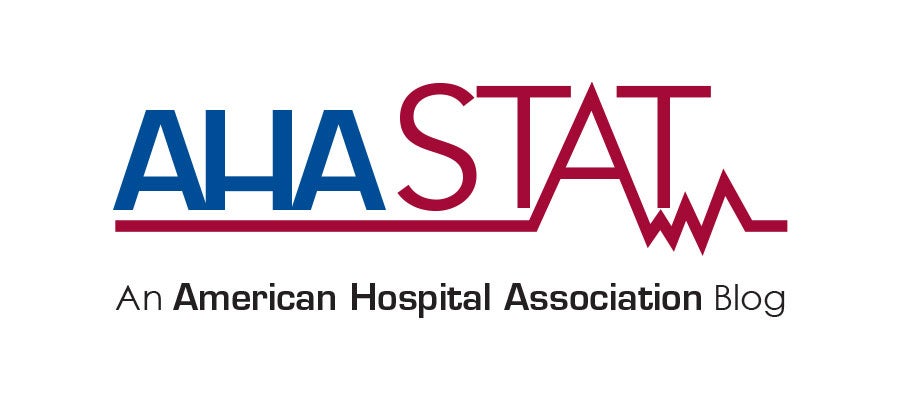
News






Latest
Centers for Disease Control and Prevention and state and territorial public health officials Friday met to discuss preparedness planning for bird flu after one person recently tested positive after exposure to infected dairy cattle in Texas.
by Joanne M. Conroy, M.D., Chair, American Hospital Association
The health care workforce provides critical services to patients, their families and communities.
The Centers for Medicare & Medicaid Services April 4 finalized changes to the Medicare Advantage and prescription drug programs for contract year 2025 intended to improve access to behavioral health care; cap and standardize MA plan compensation to brokers, including prohibiting volume-based bonuses for enrollment into certain plans; limit the distribution of personal beneficiary data by third-party marketing organizations; ensure that MA plans offer appropriate supplemental benefits; streamline enrollment for individuals dually eligible for Medicare and Medicaid; and annually review MA utilization management policies for health equity considerations.
by Rick Pollack, President and CEO, AHA
During the last two weeks we have seen a flurry of regulatory activity affecting hospitals and health care providers, and we expect that trend to continue for the next several months.
The AHA’s American Organization for Nursing Leadership will present 2024 awards for exemplary leadership practices during its annual conference April 9 in New Orleans.
Primary care providers who commit to practicing two years in a health professional shortage area can initially receive up to $75,000 in loan repayment under the National Health Service Corps Loan Repayment Program, $25,000 more than previously and the first significant increase in 30 years, the Health Resources and Services Administration announced April 4.
Almost half of rural hospitals had negative total margins in 2022 and negative patient care margins both before and after the COVID-19 pandemic, according to a report prepared for the AHA by faculty at the Virginia Commonwealth University College of Health Professions.
As part of a yearlong series devoted to rural hospitals and health systems in America, two experts from Intermountain Health discuss their "First 1,000 Days of Life" initiative, which provides wraparound services for at-risk new moms.
Nurse managers who interact purposefully with each registered nurse on their team have lower turnover, with monthly interactions such as recognitions, check-ins or corrective actions driving a 7-percentage-point improvement in the team’s annual turnover rate, according to a new report by the American Organization for Nursing Leadership and Laudio Insights.
The Centers for Medicare & Medicaid Services April 2 released its final rule for
The AHA has been made aware of a validated IT help desk social engineering scheme that uses the stolen identity of revenue cycle employees or employees in other sensitive financial roles.
The Children’s Hospital Association has released a replay of a recent webinar on the International Consensus Criteria for Pediatric Sepsis and Septic Shock, a new way to define sepsis in children once it has occurred.
AHA’s Association for the Health Care Environment has released an on-demand subscription training program to help health care leaders train, transform and retain their health care environmental services teams.
At the Health Affairs Forefront blog, officials from the Centers for Medicare & Medicaid Services provide an update on their strategy to support value-based specialty care through the CMS Innovation Center.
The Department of Health and Human Services April 2 released a white paper proposing policy solutions for Congress and others to prevent drug shortages and mitigate supply chain vulnerabilities, including collaborating with the private sector to develop and implement programs to assess and incentivize resiliency in manufacturer and hospital purchasing behavior.
The nursing workforce is becoming more diverse and highly educated, but less satisfied with their job, according to the latest National Sample Survey of Registered Nurses, conducted by the Health Resources and Services Administration between December 2022 and April 2023.
The Centers for Medicare & Medicaid Services April 1 revised its Hospital Interpretative Guidelines for Informed Consent to clarify the need to obtain informed consent from patients before medical students or other students perform important surgical tasks or sensitive or invasive procedures or examinations.
The Food and Drug Administration’s proposal to regulate laboratory developed tests would undermine innovation and reduce access to effective and appropriate care for patients, AHA April 1 told the Senate Health, Education, Labor & Pensions Committee Ranking Member.
The Centers for Medicare & Medicaid Services April 1 finalized proposed changes to Medicare Advantage plan capitation rates and Part C and Part D payment policies for calendar year 2025, which the agency estimates will increase MA plan revenues by an average 3.7% from 2024 to 2025.
by Joanne M. Conroy, M.D., Chair, American Hospital Association
In many ways, the COVID-19 pandemic ushered in a new era of innovation and safety in health care. Hospital and health system teams responded and adapted nimbly during the pandemic — developing and deploying innovative processes and creating new tools and technologies to better serve their patients, communities and care teams.

